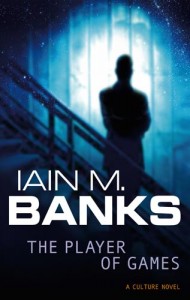Player of Games
 Player of Games
Player of Games
by Iain M. Banks
Orbit (Reprint Edition), 2008
416 pages / $15.99 Buy from Amazon
Iain M. Banks passed away on June 9th of this year from terminal cancer to the gallbladder. He had a prolific career with 27 books and came to fame with his first book, The Wasp Factory. I’ve been reading his Culture series after multiple friends urged me to read his work, declaring Banks was the best science fiction writer they’d read. The Player of Games is the second book in the Culture series and probably my favorite in the series so far, mainly because it revolves around gaming. I did a book review of the first one, Consider Phlebas, for HTMLGiant here, and while this review complements that first part, it also serves as a tribute to Banks with quotes from some of his interviews before his recent passing.
At the center of this massive, sprawling universe is the Culture. The Culture is an egalitarian form of government based in a post-scarcity world which means that everything is free because of an abundance of resources. This allows people to pursue what they want to without worry of making enough money to survive. The way the Culture maintains everything is by putting computer AIs, or Minds, in charge of the government. As anyone who has seen Star Trek can testify, even in a post-scarcity world, people can be corrupt and pursue agendas that are counter-intuitive, motivated by greed and vanity. Since the Culture is made up of robots who find such notions puerile, they do a good job maintaining the status quo. There are also no such things as laws per se. Everyone has everything they need so many of the motives for crime have vanished.
Player of Games was first published in 1988, though it was reworked from an earlier version Banks started in 1979. It exemplifies the best of the Culture books with beautiful writing, exotic locations, and thrilling plots full of intrigue. Ironically, things start slowly in an idyllic world where people can play games all day and tedium is the biggest malaise they suffer from. Gurgeh is a master of games who is bored with life because he is too good at them. While he might lose a game or two (there are even some games he is not good at), Gurgeh has a sense for gameplay that helps him to master almost anything. “I… exult when I win. It’s better than love, it’s better than sex or any glanding; it’s the only instant when I feel… real.” Only, most of the games no longer cause that sensation as no one can offer him a true challenge.
Partly motivated by his boredom and further pushed into it through a blackmail scheme perpetrated by a Culture drone, he is sent by Contact (the special forces division of the Culture) to infiltrate the Empire of Azad. His mission, outwardly, seems simple. Learn the game of Azad and play it to the best of his abilities. What exactly is the game? “The game of Azad permeated every level of society, like a single steady theme nearly buried in a cacophony of noise, and Gurgeh started to see what the drone Worthil had meant when it said Contact suspected it was the game that held the Empire together.” Official positions are awarded by rankings in the game and the winner becomes Emperor. “The idea, you see, is that Azad is so complex, so subtle, so flexible and so demanding that it is as precise and comprehensive a model of life as it is possible to construct. Whoever succeeds at the game succeeds in life (italics are mine); the same qualities are required in each to ensure dominance.”
Gurgeh starts the game badly, even worse than people had expected, caught up in minutia about the game he can’t grasp. That’s when he changes tactics and focuses on the psychology of his foes and realizes that the rest were “too concerned with winning the game quickly… the moves could become a language, and Gurgeh thought he could speak that language now, well enough to lie in it.” Banks takes the readers away from the specifics of the game and concentrates on how the different personalities play in different ways to reflect who they are. The broader strokes makes for a far more interesting read as it becomes a strategic war of wills between individuals.
July 31st, 2013 / 11:00 am
